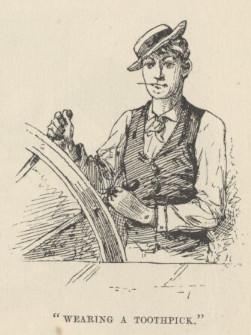On 16 February 1857 Clemens took passage for New Orleans on the packet Paul Jones. Probably the “great idea” of the Amazon journey was still alive in his mind as he later claimed , but within two weeks his old ambition to become a Mississippi pilot was rekindled. During daylight watches he began “doing a lot of steering” for Horace E. Bixby, pilot of the Paul Jones, whose sore foot made standing at the wheel painful. Bixby (1826–1912), later a noted captain as well as pilot, recalled after Clemens’s death:
I first met him at Cincinnati in the spring of 1857 as a passenger on the steamer Paul Jones. He was on his way to Central America for his health. I got acquainted with him on the trip and he thought he would like to be a pilot and asked me on what conditions he could become my assistant. I told him that I did not want any assistant, as they were generally more in the way than anything else, and that the only way I would accept him would be for a money consideration. I told him that I would instruct him till he became a competent pilot for $500. We made terms and he was with me two years, until he got his license.
Although Bixby consistently indicated that he and Clemens came to terms either at their first meeting or quite soon after, Mark Twain three times explicitly designated New Orleans as the place where he approached Bixby about becoming his steersman and where they reached an agreement. It is reasonable to assume that, before agreeing to instruct him, Bixby would have used the entire trip to New Orleans to test his ability at handling the wheel.
Sam and Horace Bixby departed New Orleans March 4, 1857 on board the Colonel Crossman with Clemens installed as the new cub and arrived in St. Louis on March 15. While in St. Louis Clemens took steps to secure the $100 that Bixby required as a down payment on his instructional fee. Some forty years afterward, in notes for his autobiography, he reminded himself that he went to his cousin James Clemens, Jr., “to borrow the $100 to pay Bixby—before I got to the subject he was wailing about having to pay $25,000 taxes in N.Y. City—said it makes a man poor! So I didn’t ask him”. Clemens borrowed the money instead from his brother-in-law, William A. Moffett, and rejoined Bixby.
Harold Bush writes: In 1857, after some strenuous years of travel throughout America that reinforced the religious heterodoxy of Sam Clemens, the newly apprenticed cub pilot came upon a copy of Thomas Paine’s deistic manifesto of the 1790s, The Age of Reason. Having been primed for its contents, he devoured its arguments and they influenced his early writings. Paine’s themes continued to influence Twain throughout his career: many of Twain’s later writings echo the vitriolic attacks on orthodox Christianity characteristic of the latter half of The Age of Reason, particularly the assaults on scriptural literalism that dominate Part II of Paine’s masterpiece. [Mark Twain in Context]
See Scharnhorst, The Early Years Chapter The River
